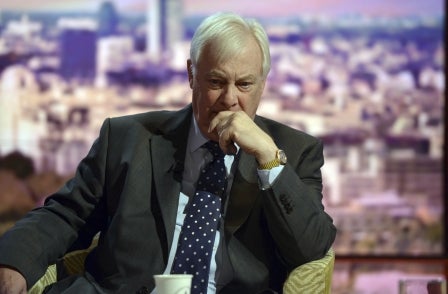
The BBC Trust has described as “bizarre” claims by former director general Mark Thompson that trust chairman Lord Patten and fellow trustee Anthony Fry misled MPs over large pay-offs to departing executives.
Ahead of an evidence session in front of the Commons’ public affairs committee on Monday, Thompson said there were “untruths and inaccuracies” in Patten and Fry’s evidence to the committee in July.
Specifically, Thompson said that Patten would have been “fully briefed” about the £949,000 severance payment received by departing deputy director general Mark Byford in 2010, and the £394,638 paid to former head of marketing Sharon Baylay.
In a submission to the PAC ahead of Monday’s evidence session, Thompson wrote: “The insinuation that they were kept in the dark by me or anyone else is false and is not supported by the evidence."
But a statement from the BBC Trust released this afternoon denied that Patten and Fry would have been briefed.
The statement said of Thompson’s new evidence: “This is a bizarre document. We reject the suggestion that Lord Patten and Anthony Fry misled the PAC. We completely disagree with Mark Thompson's analysis, much of which is unsubstantiated, in particular the suggestion that Lord Patten was given a full and formal briefing on the exact terms of Mark Byford's departure, which in any event took place before the current Chairman's arrival at the Trust.”
A further statement issued by the five trustees in post at the time of Byford’s departure in September 2010, including Fry, said: “The BBC executive negotiated the terms for Mark Byford's redundancy a full six months before Lord Patten took office as Chairman of the BBC Trust.
"We were not asked for approval of the financial package – formally or informally – nor did we give it. The Trust was assured that the package was within contractual terms and that the Chairman of the BBC's executive remuneration committee had agreed to it being approved.
"The Trust's concern throughout this period was to ensure that the Director-General met the strategy set for him by the Trust: to reduce radically both the number of senior managers and the cost of the management paybill, and he achieved both.”
Patten himself said he was “looking forward” tor returning to the committee to give evidence.
He told ITN: "There is one aspect of this very long deposition by Mr Thompson which I've found very curious, which is the focus on Mark Byford and his payoff because as anybody that works at the BBC knows that happened before I became Chairman of the Trust so it's slightly difficult to see how I could have been responsible for that."
Thompson, Fry and Patten will all give evidence again on Monday, alongside with the former executive board remuneration chair Marcus Agius, former BBC Trust chair Sir Michael Lyons and BBC HR director Lucy Adams,
Adams herself has also written to MPs on the committee to admit that she misled them over her role in Byford’s pay-off when she gave evidence in July.
In evidence published today, Adams, who announced she was to leave the BBC last week, wrote: “During the July 10 hearing, the chair referred to a memo of October 7 2010.
"At the time, I was not clear which document the chair was referring to and so I could not recollect with absolute certainty whether or not I had seen the memo sent by Mark Thompson to the then chairman on October 7 2010.
"Since the hearing, I am now clear which document was being referred to and I can confirm that I was involved in drafting that memo, although I had not seen the final note sent to the Trust until recently."
It has also emerged that the BBC has written to four former staff, whose pay-offs were investigated by the National Audit Office, to tell them they could be named to the committee.
BBC head of corporate affairs Andrew Scadding said the four had "resigned at the time of well publicised operational incidents at the BBC".
Labour’s former culture secretary Ben Bradshaw said the escalating row showed that the BBC trust was no longer a suitable body to regulate the corporation.
He told BBC Radio 4’s The World at One: "I do hope that the Government will use this shambles as another reason for looking again at the governance of the BBC when it comes to our charter renewal.
"The BBC should have nothing to fear from independent regulation. It could be regulated by Ofcom – then it could have its own board which would do the job the boards of most organisations do and that would be a much more healthy settlement."
Email pged@pressgazette.co.uk to point out mistakes, provide story tips or send in a letter for publication on our "Letters Page" blog
